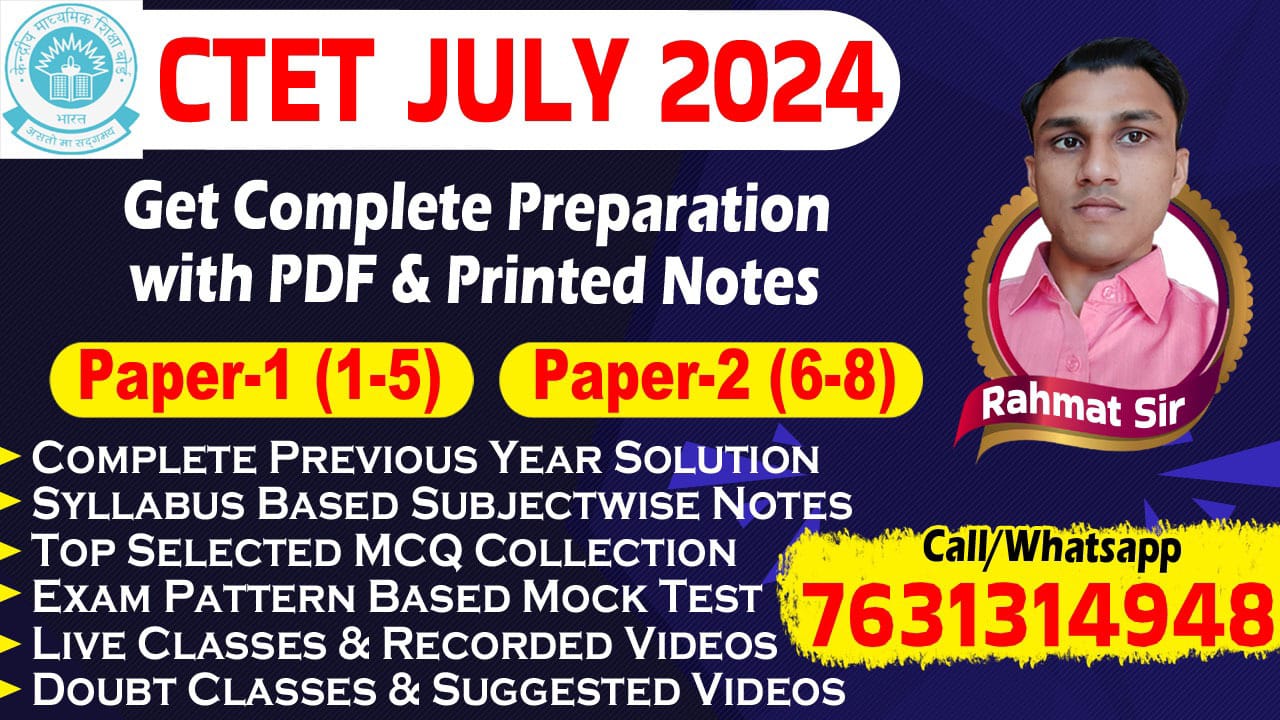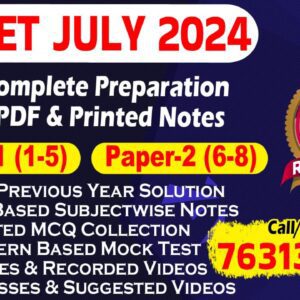Description
The Central Teacher Eligibility Test (CTET) Paper 2 is conducted for candidates who intend to teach Classes VI to VIII. It covers several subjects, and a comprehensive set of notes should include the following sections:
- Child Development and Pedagogy
- Language I
- Language II
- Mathematics and Science (for Mathematics and Science teachers)
- Social Studies/Social Science (for Social Studies/Social Science teachers)
- Child Development and Pedagogy
- Child Development (Primary School Child):
– Concept of development and its relationship with learning
– Principles of development of children
– Influence of Heredity & Environment
– Socialization processes: Social world & children (Teacher, Parents, Peers)
– Piaget, Kohlberg, and Vygotsky: constructs and critical perspectives
– Concepts of child-centered and progressive education
– Critical perspective of the construct of Intelligence
– Multi-Dimensional Intelligence
– Language & Thought
– Gender as a social construct; gender roles, gender-bias, and educational practice
– Individual differences among learners, understanding differences based on diversity of language, caste, gender, community, religion, etc.
– Distinction between Assessment for learning and Assessment of learning; School-Based Assessment, Continuous & Comprehensive Evaluation: perspective and practice
– Formulating appropriate questions for assessing readiness levels of learners; enhancing learning and critical thinking in the classroom and for assessing learner achievement.
- Concept of Inclusive Education and Understanding Children with Special Needs:
– Addressing learners from diverse backgrounds including disadvantaged and deprived
– Addressing the needs of children with learning difficulties, ‘impairment’ etc.
– Addressing the Talented, Creative, Specially abled Learners
- Learning and Pedagogy:
– How children think and learn; how and why children ‘fail’ to achieve success in school performance.
– Basic processes of teaching and learning; children’s strategies of learning; learning as a social activity; social context of learning.
– Child as a problem solver and a ‘scientific investigator’
– Alternative conceptions of learning in children, understanding children’s ‘errors’ as significant steps in the learning process.
– Cognition & Emotions
– Motivation and learning
– Factors contributing to learning – personal & environmental
- Language I
- Language Comprehension:
– Reading unseen passages – two passages one prose or drama and one poem with questions on comprehension, inference, grammar, and verbal ability (Prose passage may be literary, scientific, narrative or discursive).
- Pedagogy of Language Development:
– Learning and acquisition
– Principles of language Teaching
– Role of listening and speaking; function of language and how children use it as a tool
– Critical perspective on the role of grammar in learning a language for communicating ideas verbally and in written form
– Challenges of teaching language in a diverse classroom; language difficulties, errors, and disorders
– Language Skills
– Evaluating language comprehension and proficiency: speaking, listening, reading, and writing
– Teaching-learning materials: Textbook, multi-media materials, multilingual resource of the classroom
– Remedial Teaching
- Language II
- Comprehension:
– Two unseen prose passages (discursive or literary or narrative or scientific) with questions on comprehension, grammar, and verbal ability.
- Pedagogy of Language Development:
– Same as Language I (concepts of language acquisition, principles of teaching, role of listening and speaking, challenges in teaching language, evaluation of skills, etc.)
- Mathematics and Science
- Mathematics:
– Content:
– Number System
– Algebra
– Geometry
– Mensuration
– Data Handling
– Pedagogical Issues:
– Nature of Mathematics/Logical thinking; understanding children’s thinking and reasoning patterns and strategies of making meaning and learning
– Place of Mathematics in Curriculum
– Language of Mathematics
– Community Mathematics
– Evaluation through formal and informal methods
– Problems of Teaching
– Error analysis and related aspects of learning and teaching
– Diagnostic and Remedial Teaching
- Science:
– Content:
– Food
– Materials
– The World of the Living
– Moving Things People and Ideas
– How things work
– Natural Phenomena
– Natural Resources
– Pedagogical Issues:
– Nature & Structure of Sciences
– Natural Science/Aims & objectives
– Understanding & Appreciating Science
– Approaches/Integrated Approach
– Observation/Experiment/Discovery (Method of Science)
– Innovation
– Text Material/Aids
– Evaluation – cognitive/psychomotor/affective
– Problems
– Remedial Teaching
- Social Studies/Social Science
- Content:
– History:
– When, Where and How
– The Earliest Societies
– The First Farmers and Herders
– The First Cities
– Early States
– New Ideas
– The First Empire
– Contacts with Distant lands
– Political Developments
– Culture and Science
– New Kings and Kingdoms
– Sultans of Delhi
– Architecture
– Creation of an Empire
– Social Change
– Regional Cultures
– The Establishment of Company Power
– Rural Life and Society
– Colonialism and Tribal Societies
– The Revolt of 1857-58
– Women and reform
– Challenging the Caste System
– The Nationalist Movement
– India After Independence
– Geography:
– Geography as a social study and as a science
– Planet: Earth in the solar system
– Globe
– Environment in its totality: natural and human environment
– Air
– Water
– Human Environment: settlement, transport and communication
– Resources: Types-Natural and Human
– Agriculture
– Social and Political Life (Civics):
– Diversity
– Government
– Local Government
– Making a Living
– Democracy
– State Government
– Understanding Media
– Unpacking Gender
– The Constitution
– Parliamentary Government
– The Judiciary
– Social Justice and the Marginalized
- Pedagogical Issues:
– Concept & Nature of Social Science/Social Studies
– Class Room Processes, activities and discourse
– Developing Critical thinking
– Enquiry/Empirical Evidence
– Problems of teaching Social Science/Social Studies
– Sources – Primary & Secondary
– Projects Work
– Evaluation


